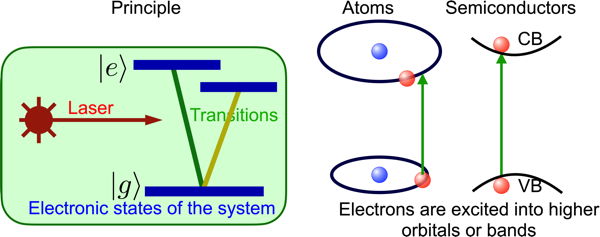


Laser spectroscopy is an important spectroscopic method. It uses optical photons for exciting transitions between different electronic energy levels. These electronic energy levels can be those of isolated atoms or ions, or gaps in the band structure of a solid, e.g. valence and conduction band of a semiconductor.
Laser spectroscopy offers exquisite sensitivity: it is possible to carry out experiments on single atoms, ions or molecules. In addition, time-resolved laser experiments achieve very high resolution in time, on the order of a few fsec. Continuous lasers, on the other hand, offer very high frequency resolution: Special laser systems have a frequency stability of less than 1 Hz.
